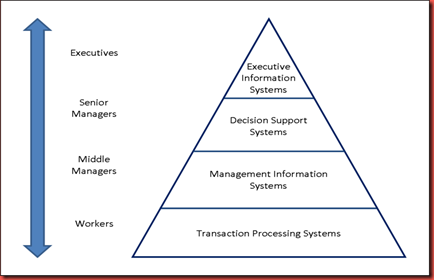
So here are the four types of IS explained in detail.
1. Transaction Process Management (TPS) : TPS is a system that collects, stores, modifies and retrieves the transactions of an organization. It can speed up the performance of an organization. Many organizations these days heavily rely on TPS that a simple breakdown in the system will stop the business from running. Normal workers in the lower level of the organization normally operate the TPS. A very good example of the TPS is the cashier of a super market where all the simple transactions are recorded and processed.
2. Management Information System (MIS) : This system provides information about sales, inventories, and other data that will help the business to be run in an efficient and effective way. An MIS can support a business in making long term plans by providing reports based on performance analysis with feedback on all areas of the business. Apart from showing how things are going, MIS will also show why and where the performance is failing to meet the plan.
3. Decision Support System (DSS) : This system helps the organization in decision making. It makes predictions on future performance like whether or not the business will be able to achieve its goals or how much input is needed to achieve the desired results. DSS can help the business in speeding up the problem-solving process and reveal new approaches to thinking about problems and increasing performance which is exactly what businesses are looking for these days to keep ahead of competitions.
4. Executive Support System (EIS) : This is kind of a specialized form of DSS but for Executives. It supports the senior executives in making decisions by providing easy access to internal and external information relevant to meeting the strategic goals of the organization.
So these are the four types of information systems that are widely used in all levels of organizations. There will come a time when no organization will exist without the help of information systems.
No comments:
Post a Comment